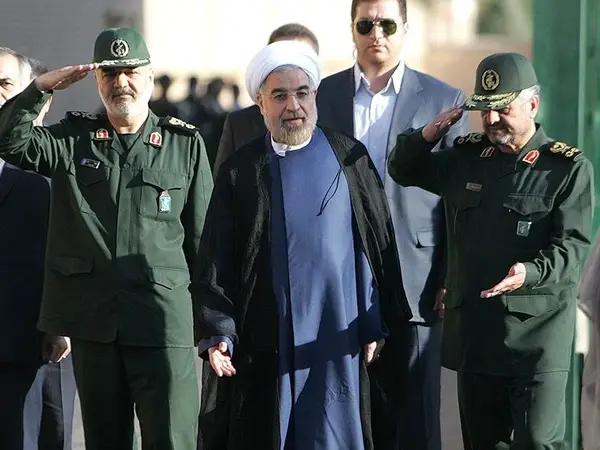Despite lack of any evidence, IRGC-affiliated Tasnim news claims that former Iranian president Hassan Rouhani is preparing to run for parliament next March.
The short report Tuesday did not provide any evidence or sources, but said Rouhani convenes his election meetings with aides on weekly basis.
Rouhani or people close to him have not said anything about the elections or his political plans and there are no reports of him having formed an election team.
Iran’s hardliners and the Revolutionary Guard who control the current parliament are opposed to Rouhani or any other politician who in Iran’s political context can be described as centrist or reformist.
Tasnim makes that clear, repeating harsh criticism routinely voiced by hardliners that the country’s current economic crisis is the fault of the Rouhani administration, which they say counted on good relations with West and lifting of sanctions instead of presumably focusing on indigenous efforts to boost production.
However, since Rouhani left office in mid-2021, the hardliners who took over both the presidency and the parliament have made matters much worse.
Iran’s currency has halved in value since August 2021 and inflation has soured above an annual 40-percent rate.
The current members of parliament have very little to show after three years into their term and given months of anti-regime protests they are very nervous about their re-election according to commentators who write in Tehran media.
Last week, news emerged that some lawmakers are entertaining the idea of barring anyone who in the past has served three terms in the legislator from running next year. Already, several politicians and pundits have sharply criticized the possible move, saying that this is only aimed at eliminating competition to the sitting parliament packed with hardliners.
But given the fact that in the 2020 elections most centrists and reformists were barred from running by the Guardian Council controlled by Supreme Leader Ali Khamenei, Rouhani would not risk putting his candidacy forward unless he receives assurances from him that he would not be rejected. He has already said that next elections must be free and fair.
Also, as a former president, Rouhani would run only if he can receive backing by the majority in the new parliament to be crowned Speaker. For that, “He would need to have a sizeable contingent of supporters, which means that Khamenei has to allow non-hardliners also to run and get elected,” political analyst Behrouz Turani told Iran International. He also said, “The report by Tasnim could be a ploy to test Rouhani and see if he will deny any intention to run next year.”
It should also be noted that the Iranian campaigns typically do not start months before an election.
For now, no one knows what the Supreme Leader is thinking. His strategy of handing over both the parliament and the presidency to loyal, ultra-conservative politicians and operatives has backfired.
Not only the economy has sunk deeper into crisis, but the Islamic Republic faces the largest popular opposition in its 44-year history. Even many loyalists express total disappointment with President Ebrahim Raisi and the parliament in the local media.
In the past, Khamenei has played the political game of allowing reformists to win elections to mollify a dissatisfied population, and he might decide to play the same game again, but Rouhani during his presidency has made it clear that he was not happy with Khamenei’s and IRGC’s interference in the affairs of the government.
Moreover, some voices have raised the issue of a constitutional change, meaning to eliminate or restrict outfits that are Khamenei’s tools for interference.
After massive protests and lingering instability, this time the political atmosphere will be different from past elections. Either Khamenei has to double down in supporting the hardliners or has to allow other regime insiders frustrated with him and angry with the IRGC to take over the parliament.
